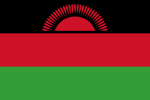Corruption in Malawi has a long and complex history with rapid evolvement over time.[1][2] During the colonial era, corruption was prevalent, with colonial officials embezzling funds and engaging in other corrupt practices.[3] After independence in 1964, Hastings Kamuzu Banda's regime perpetuated corruption, using state resources for personal gain and suppressing any opposition. [3][4]
In the early 2000s, the government established institutions such as the Anti-Corruption Bureau and the Directorate of Public Prosecutions to combat corruption. However, these efforts were hampered by lack of political will, inadequate funding, and limited capacity.
Corruption has taken many forms in Malawi, including bribery, embezzlement, nepotism, abuse of power, and political corruption. Public officials have been known to demand bribes for services, while politicians have embezzled funds meant for development projects.[3]
In Transparency International's 2023 Corruption Perceptions Index, Malawi scored 34 on a scale from 0 ("highly corrupt") to 100 ("very clean"). When ranked by score, Malawi ranked 115th among the 180 countries in the Index, where the country ranked first is perceived to have the most honest public sector.[5] For comparison with worldwide scores, the best score was 90 (ranked 1), the average score was 43, and the worst score was 11 (ranked 180).[6] For comparison with regional scores, the average score among sub-Saharan African countries [Note 1] was 33. The highest score in sub-Saharan Africa was 71 and the lowest score was 11.[7]
- ^ Cite error: The named reference
:3was invoked but never defined (see the help page). - ^ "Nightline Africa: Malawi Prosecutor Drops Charges Against Former President Muluzi and More". Voice of America. 2023-06-03. Retrieved 2024-06-14.
- ^ a b c "Malawi - Colonialism, Independence, Lake Nyasa | Britannica". www.britannica.com. 2024-06-11. Retrieved 2024-06-14.
- ^ "Effects of colonialism on Malawi". www.lawsociety.ie. Retrieved 2024-06-14.
- ^ "The ABCs of the CPI: How the Corruption Perceptions Index is calculated". Transparency.org. 20 December 2021. Retrieved 15 June 2024.
- ^ "Corruption Perceptions Index 2023: Malawi". Transparency.org. Retrieved 15 June 2024.
- ^ "CPI 2023 for Sub-Saharan Africa: Impunity for Corrupt Officials, Restricted Civic Space & Limited Access to Justice". Transparency.org. Retrieved 15 June 2024.
Cite error: There are <ref group=Note> tags on this page, but the references will not show without a {{reflist|group=Note}} template (see the help page).
